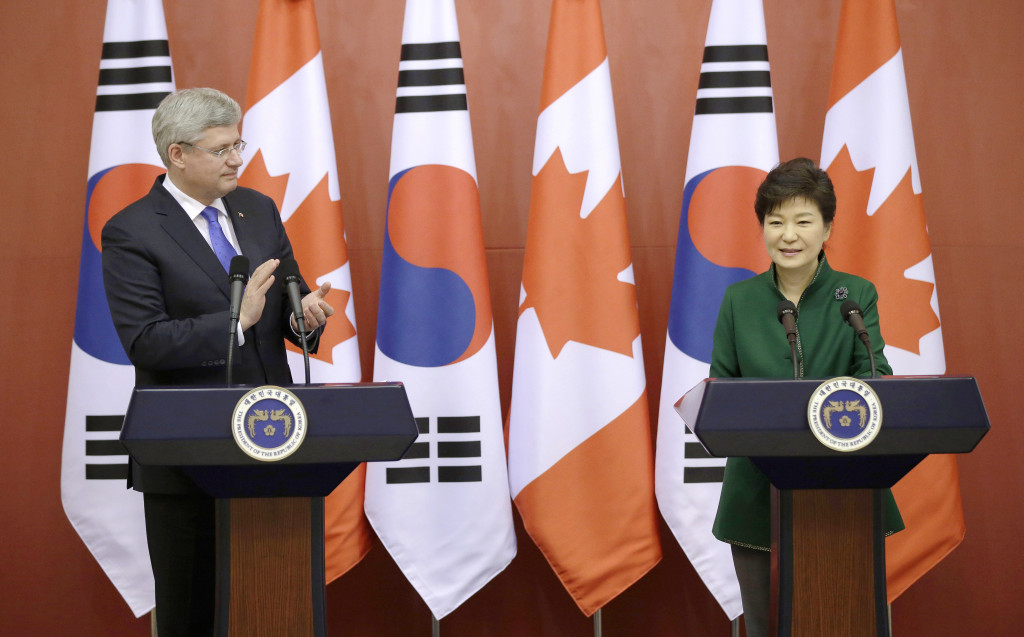PM Stephen Harper talks up benefits of Canada-South Korea free-trade agreement
By Patrick Vaillancourt, News Editor
Prime Minister Stephen Harper stopped in Vancouver on March 12 after returning from an historic trip to South Korea, where both countries finally signed a long-awaited free-trade pact.
Harper met with South Korean President Park Geun-hye on to sign a free-trade agreement (FTA) that has been in the works for a decade. This is the first FTA Canada has signed in East Asia, and follows similar agreements South Korea has implemented with the United States.
Harper states that the deal, which will virtually remove all tariffs for goods travelling between the two countries, will benefit British Columbia the most.
“There is no province that is going to benefit from this deal with Korea more than British Columbia,” said Harper to business leaders at the BC Chamber of Commerce.
Harper said that British Columbia is most familiar with “export opportunities that exist in Korea and through Korea to other Asian markets.”
The Canadian government hopes that the deal with Korea will be the beginning of renewed free-trade negotiations with other countries.
Once fully implemented, the elimination of tariffs on Korean imported goods will be welcome news to Canadian consumers looking to purchase a wide-array of electronics and vehicles made by Korean auto powerhouses Hyundai and Kia Motors. The agreement includes provisions favourable to the South Koreans, who sought to protect some of their agricultural products, such as rice, from market liberalization.
On the flip side, Korean consumers can expect to pay less for food and other agricultural products, such as beef, pork, grains, and mineral fuels and oils. South Korea will gradually reduce tariffs on Canadian beef over a period of 15 years.
The Canadian auto industry has been vocal in their opposition to the free-trade deal with South Korea, saying that the pact would likely result in the loss of thousands of Ontario auto-manufacturing jobs. Harper, however, defended the deal by saying that Canadian industry simply has to become more competitive.
“We’re in an era where we are not going to win by trying to protect sectors,” said the prime minister. “We have got to get out there, we’ve got to compete with the best and we’ve got to win.”
Auto unions cite an almost $4-billion trade deficit between Canada and Korea, most of which is in the auto sector; the unions also say that the value of cars will far outweigh the value of any agricultural products Canadian farmers will send to the Korean peninsula, which threatens to only further the trade deficit.
Critics of the agreement may be correct. The trade deficit between the United States and South Korea only grew after the implementation of the 2012 US-ROK Free-Trade Agreement, with reports that the US has lost roughly $9.2-billion in exports in the first two years of the agreement. Many American economists are calling the deal a “failure.”
The signing of the FTA was also an opportunity for both Harper and President Park Geun-hye to speak to a broader audience, playing up their respective global issues.
Harper called on Russia to put an end to their involvement in the ongoing crisis in Ukraine, while the South Korean president called on Harper to support Korea’s desire to join the multilateral Trans-Pacific Partnership (TPP).
“Following the FTA, we have another tool to further boost investment and trade of our two countries, namely the TPP,” said Park. “I hope that Canada will support us if we take part.”
The pact is now undergoing a legal review process in both countries before it will be brought to lawmakers for adoption. The deal could be implemented as early as June.


